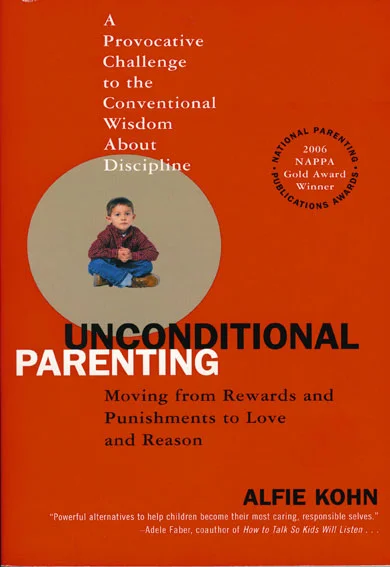reminds us what an incredible blessing it is to be a parent
/UNCONDITIONAL PARENTING
by Alfie Kohn - Atria Books, 2006
in / parent + teacher books
Alfie Kohn’s clarion call is for a ‘working with’ rather than a ‘doing to’ approach to parenting, educating and otherwise interacting with children. Unconditional Parenting is his coalface parenting book.
So that we’re ready to try something new as a parent, Kohn first sets out the take-home message - from some alarming research about what traditional ‘doing to’ style parenting is, well, ‘doing to’ our children. For example:
"Children who have been subject to less control – that is, those who have been given more say about how to play – were more likely to follow their mother’s instructions." (p.52)
"…parents who punish[ed] rule-breaking behavior in their children at home often had children who demonstrated higher levels of rule-breaking when away from home." (p.64)
"Competition makes self-esteem conditional and precarious, and it has that effect on winners and losers alike. …it appears that anytime children are set against one another such that one can succeed only by making others fail, there is a psychological price to be paid." (p.77)
This is worrying stuff at first, because it goes against most everything that is generally considered ‘good parenting’. You know, help your child win at all costs (long study hours, excellence in sports etc), set the rules and establish boundaries and be absolutely consistent in enforcing them (through punishments or rewards), give clear and precise instructions continually - and so on through to time-out as a ‘behaviour modification’ technique, praise and top-down family decisions.
But what is more worrying, is the effect all that has on our child’s development and, even more so, on our relationship with our child.
I don’t believe I’ve ever met a parent who would say their primary goal for the child is that they be a captain of industry and who cares if they’re happy, have good relationships, contribute to society, are resilient or kind. Yet many of the parenting techniques so widely touted as effective are designed solely to produce a behaviour, without any attempt to develop desirable character traits such as these.
In place of all the usual behaviour modification/good parenting techniques, Kohn offers guiding principles and some practical advice. He’s not living in a dream world here – in fact he acknowledges that:
"When our kids grow up, there will be plenty of occasions for them to take their places as economic actors, as consumers and workers, where self-interest rules and the terms of each exchange can be precisely calculated."
And we all know that’s so - but what about the family? Here’s Kohn again:
"But unconditional parenting insists that the family ought to be a haven, a refuge, from such transactions. In particular, love from one’s parents does not have to be paid for in any sense. It is purely and simply a gift. It is something to which all children are entitled." (p.19)
Well, of course. Now it’s just a matter of making sure that our actions have the effect of reinforcing that idea rather than destroying it! But, if too much control is damaging, and punishments are damaging, and rewards are damaging, and competition is damaging, and time out is damaging, then what are we to do?
Here’s Kohn’s 30-second version:
Be reflective.
Reconsider your requests.
Keep your eye on your long-term goals.
Put the relationship first.
Change how you see, not just how you act.
R-E-S-P-E-C-T
Be authentic.
Talk less, ask more.
Keep their ages in mind.
Attribute to children the best possible motive consistent with the facts.
Don’t stick your no’s in unnecessarily.
Don’t be rigid.
Don’t be in a hurry. (p.119-120)
You’ll want to read the book to get a more detailed look at each of those ideas. Personally, I have a family story about how each one of those ideas changed my relationship with my children for the better, helped our family run more smoothly, and helped my children grow into people who can make decisions that balance their own needs and those of others. (Actually it’s more than one story in most cases.)
To save this post from turning into a book itself, I’ll keep them for another time. Instead I’ll give you my own 30-second version of how Unconditional Parenting translates into everyday parenting:
Maintain integrity – be honest, be kind, be loving, be thoughtful
If a child is demonstrating what is often referred to as ‘attention seeking behaviour’ – give them attention – it’s what they need!
Don’t use the inherent power in your position as a parent as a tool to manipulate your child
Remember what an incredible privilege it is to be a parent
Unconditional Parenting is a book to return to often – to scribble notes in the border – to share – to ponder on – and to practice. I hope you’ll get hold of a copy and I’d love to hear your experiences ‘working with’ the children in your care.







